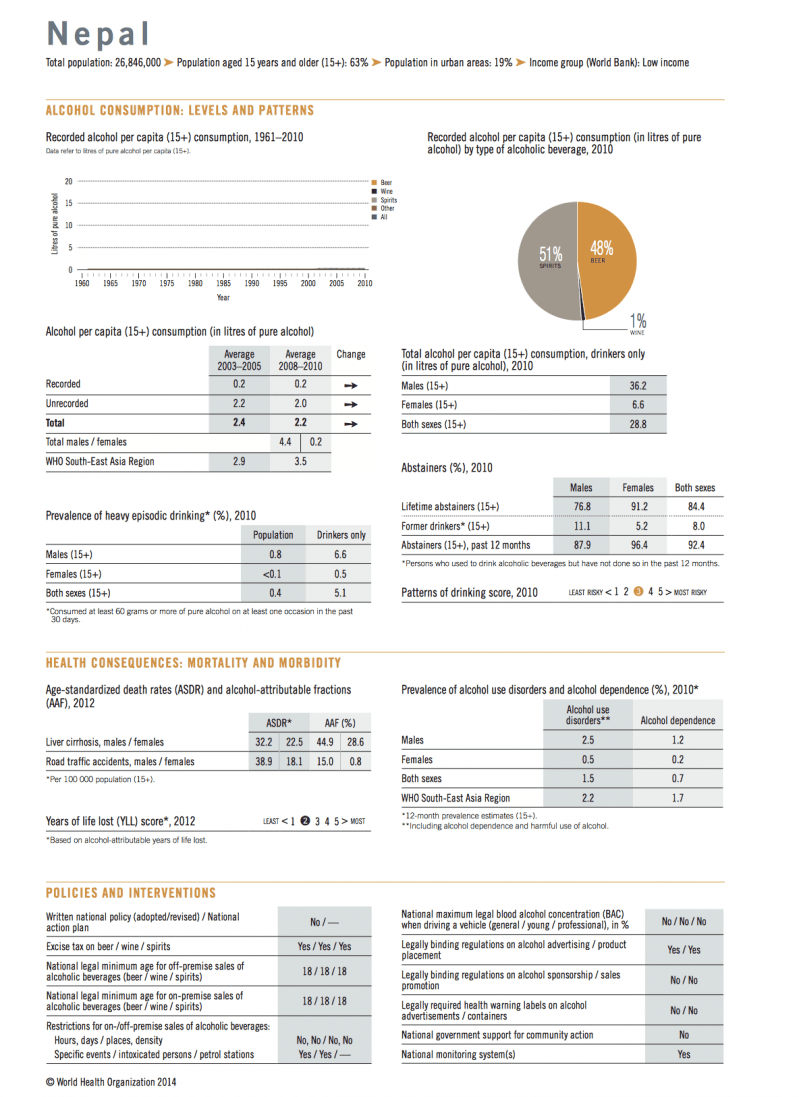The government of the Federal Democratic Republic of Nepal, is planning to adopt a new policy to coherently and evidence-based regulate sales of alcohol products in the country of 26.8 million inhabitants.
The core features of the new draft alcohol policy include:
- Total ban of alcohol advertisement, promotion and sponsorship.
- Decreasing availability: in the future alcohol will only be sold by especially licensed shops for certain hours.
- Decreasing alcohol availability: the minimum age for alcohol purchases is increased from 18 to 21 years.
- All alcohol containers will have at least a 75% health warning. Nepal will be first country in the world to introduce 75% pictorial warning.
- Alcohol will no longer be used in Government-sponsored programs and events.
- Alcohol is no longer allowed to be sold in public places including heritage sites, educational institutions, and sports complexes.
Tobacco-style warnings on alcohol containers
The new policy will require each alcohol producer to put a pictorial warning that depicts liver cirrhosis and other adverse effects on other organs, covering at least 75% of the container.
Additionally, a statutory warning that alcohol use is injurious to health should be prominently displayed on the bottle.
Decreasing alcohol availability
The new law will contain regulations that decrease alcohol availability in Nepal. People below the age of 21 as well as pregnant women will no longer be allowed to purchase alcoholic products. Currently, the legal age for alcohol sales was 18.
Furthermore, the hours of alcohol retail will be decreased, introducing better rules for alcohol retail stores to operate between 5am to 7pm. Currently, Nepal does not have any limits on hours, days, place or density of alcohol sales for both the on- and off-premise trade.
Positive feedback from communities and civil society
Civil society representatives called the new alcohol policy a success and expressed satisfaction with the Cabinet endorsing it.
Rashmila Shakya who is Programmes Director at Child Workers in Nepal (CWIN) said:
It is definitely a comprehensive policy based on WHO’s Global Alcohol Strategy. It was really good that the leader and members of the task force were convinced that it should based on the Global strategy.”
Rashmila Shakya, CWIN
Next steps
It is expected that after the government adopts the new alcohol policy a new and evidence-based “Alcohol Control and Regulation Bill” will also be developed.
Now, the challenge is to effectively implement the policy. We need the law immediately in order to be able to implement and we need strong monitoring mechanisms,” said Ms Shakya.
Besides this, it is important to educate people and stakeholders about the law and alcohol harms. We look forward for our government taking initiatives and as civil society we are ready to support.”
Rashmila Shakya, CWIN
In the next step, the drafting committee consisting of representatives from the Ministry of Health and other concerned Ministries is working to solve some remaining issues before the Alcohol Control and Regulation Bill is tabled in Parliament.
